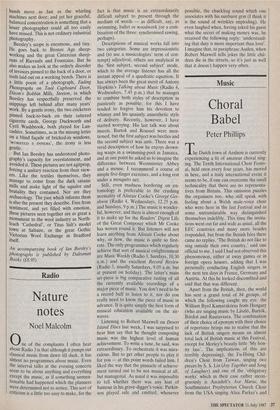Radio
Nature notes
Noel Malcolm
0 ne of the complaints I often hear about Radio 3 is that although it pumps out classical music from dawn till dusk, it has almost no programmes about music. Even the interval talks at the evening concerts seem to be about anything and everything except the music, as if something unmen- tionable had happened which the planners were determined not to notice. This sort of criticism is a little too easy to make, for the
fact is that music is an extraordinarily difficult subject to present through the medium of words — as difficult, say, as swimming, ballet or woodwork (or a com- bination of the three: synchronised sawing, perhaps).
Descriptions of musical works fall into two categories. Some are impressionistic and (to use a musicologists' term of con- tempt) adjectival; others are analytical in the 'first subject, second subject' mode, which to the average listener has all the instant appeal of a quadratic equation. It has always been the great merit of Antony Hopkins's Talking about Music (Radio 4, Wednesdays, 7.45 p.m.) that he manages to combine both styles of description as painlessly as possible; for this I have tended to forgive him his devotion to whimsy and his quaintly anaesthetic style of delivery. Recently, however, I have started worrying. His last talk was about insects. Bartok and Roussel were men- tioned, but the first subject was beetles and the second subject was ants. There was a vivid description of how he enjoys drown- ing wasps in a swimming-pool in Jamaica, and at one point he asked us to imagine the difference between Westminster Abbey and a mouse. I recommend a course of simple five-finger exercises, and a long rest under a mosquito net.
Still, even madness bordering on en- tomology is preferable to the crushing normality of Alistair Cooke's George Ger- shwin (Radio 4, Wednesdays, 12.25 p.m. and Sundays, 9 p.m.) The music is wonder- ful, however, and there is almost enough of it to make up for the Readers' Digest Life of the Great Composer which Mr Cooke has woven round it. But listeners will not learn anything from Alistair Cooke about why, or how, the music is quite so first- rate. The only programmes which regularly achieve that sort of musical enlightenment are Music Weekly (Radio 3, Sundays, 10.30 a.m.) and the excellent Record Review (Radio 3, usually Saturdays, 9.05 a.m. but at present on holiday). The latter's main set-piece is big comparative tasting of all the currently available recordings of a major piece of music. You don't need to be a record buff to listen to it, nor do you really need to know the piece of music in advance. It is quite simply the best form of musical education available on the air- waves.
Listening to Robert Maxwell on Desert Island Discs last week, I was surprised to hear him say that he thought composing music was the highest level of human achievement. To write a tune, he said, was extraordinary. To orchestrate it was mira- culous. But to get other people to play it for you — at this point words failed him. liked the way that the pinnacle of achieve- ment turned out to be not musical at all, but managerial. As usual it was impossible to tell whether there was any hint of humour in his grave-digger's voice. Parkin- son played safe and emitted, whenever possible, the chuckling sound which one associates with his sunburst grin (I think it is the sound of wrinkles imploding). He even laughed when, having asked his guest what the secret of making money was, he received the following reply: 'understand- ing that duty is more important than love'. I imagine that, to paraphrase Auden, when Robert Maxwell tells jokes the little chil- dren die in the streets, so it's just as well that it doesn't happen very often.


















































 Previous page
Previous page